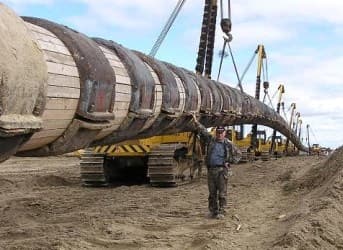After sparring with Secretary Clinton over a missile defense shield, Russian officials last year claimed their 2008 war with Georgia blocked NATO ambitions to move east. The saber rattling by Moscow along the western front of the Soviet Union highlights the notion that natural gas diplomacy in Europe has more to do with geopolitics than energy resources, particularly for the transit networks outlined in the Southern Corridor. And with a crumbling European economy tearing at the stitches holding the European Union together, members of the eurozone may find themselves reaching for Russian vodka to stay warm next year.
The last time Russian natural gas monopoly Gazprom decided to close the spigot on the natural gas transit network through Ukraine in winter 2009, Europeans shivered for weeks as if Stalin himself had poked his head out of the gas terminals along the country's western border. The deal that ended the impasse eventually landed Yulia Tymoshenko, the braided princess of the country's Orange Revolution, in a penal colony in Ukraine on corruption charges brought by the pro-Kremlin government in Kiev.
The Europeans have since tried to coax Kiev closer into its sphere of influence with tasty trade incentives all while the Ukrainian government tries to get a better deal from Gazprom, which keeps trying to buy the gas transit network built through Ukraine during the Soviet era. Meanwhile, the European leadership, with the help of the Cold War victors in Washington, has tried to break Russia's grip on the European energy sector through a series of gas-transit networks dubbed the Southern Corridor.
Of the three projects involved, the Nabucco pipeline is the most ambitious with a $10 billion price tag and a planned capacity of 1 trillion cubic feet of natural gas per year. Despite widespread political backing for the project, at least on paper, the fate of Nabucco is in doubt because of its hefty price tag and lack of firm supplier commitments.
German energy company RWE, a Nabucco consortium member, appears ready to wash its hands of the project after having its purse snatched away when German Chancellor Angela Merkel's decided nuclear energy was a dangerous investment. But the global economy is interconnected, so that may not be a big deal, unless of course you listen to Richard Morningstar, Washington's energy czar to Europe, who said he supports Nabucco so long as it makes economic sense in the European economy.
Nabucco insists it's on the right path, however, and didn't even bother with a comment when RWE said it was getting cold feet. It still maintains it provides the most bang for the buck in terms of European energy security. Nobody's officially signed up yet to put gas in the pipeline, however.
Energy companies from Chevron to BP view natural gas as the greatest thing since, well, since oil. European countries, however, don't have much of their own and any hopes for seriously tapping into shale deposits were shot down by French and Bulgarian fracking bans. And OPEC, in its latest report, said "undoubtedly" the European debt crisis would continue to drag on the global economy. Not exactly a ringing endorsement for economic viability for much of anything in the eurozone.
It's not unreasonable to say the Cold War is alive and well and running through a natural gas pipeline somewhere in Eastern Europe. Ukraine hosts 80 percent of all of the Russian gas bound for Europe, which is engaged in a tug-of-war with the Kremlin in a line stretching from Warsaw to Baku on Turkey's western coast.
Any guess as to where Ukraine's energy minister spends most of his time?
"The Gazprom headquarters hosted today a working meeting between Alexei Miller, chairman of the company's management committee and Yuri Boiko, Ukrainian energy and coal industry minister," said Gazprom in a statement Tuesday.
Oh, and South Stream, Russia's answer to Nabucco? Construction on that starts in December.
ADVERTISEMENT
Pass the vodka.
By. Daniel J. Graeber of Oilprice.com



















However its seems its perhaps not as much 'fun' as it used to be (no smileys, no comment ratings etc.). Oh well win some lose some. Is there still a comment word limit? And have we lost the thing where we had to write funny alphanumeric combinations in order to get the comment through?
Back to the article. Russia has Nordstream that will supposedly carry a great deal of thegas capacity that previously went through the Ukraine. Then they arev planning South Stream that will go up nthrough the Balkans? So the Russians are trying to provide themselves with alternatives to 'fractious' Ukraine.
Nabucco is a strange creature. It was oringinally bdesigned to provide the EU with an alternative Azerbaijani supply to Russia in case Russia decides to 'get tough' again. However the Georgian war effectively put paid to that idea. Nabucco runs through Georgia from Baku. So the Russians could theoretically 'cause it to cease operations' any time they pleased. High risk high insurance, expensive project... Also Russia has some influence in Azerbaijan with military also stationed in Armenia and the Nagurno-HKarabakh unresolved...
So Nabucco still more or less dead in the water, while South Stream more politically viable. Or so it would seem... And the Ukraine in the middle of all this... No wonder Ukraine and Gazprom are doing a lot of talking...!
What is happening now has to do with money, and with luck and the new gas scene in the U.S., we might get off easy.